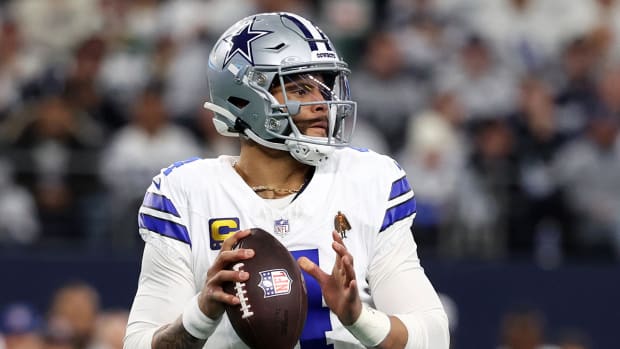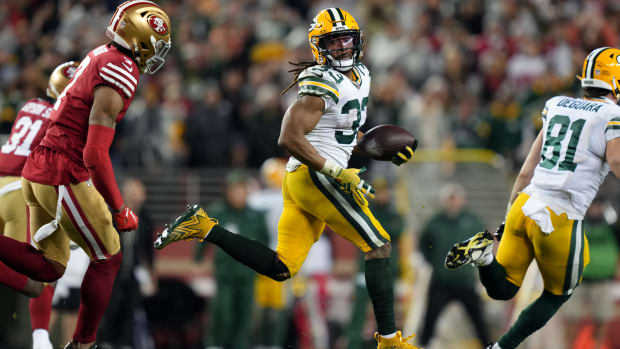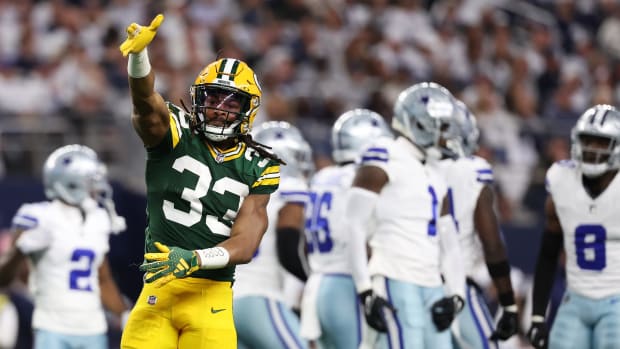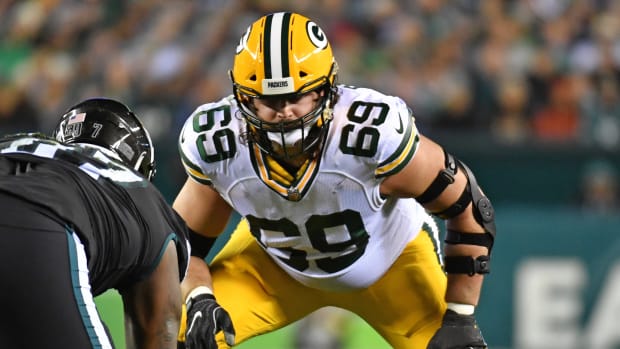Packers vs. 49ers: Three Reasons to Worry, Playoffs Edition
GREEN BAY, Wis. – The Green Bay Packers vs. San Francisco 49ers.
It’s a series steeped in tradition, big games and excellence. On Saturday night, these heavyweights will slug it out one more time. The winner will advance to the NFC Championship Game. The loser will endure a long offseason.
The Packers have won the last two games, including in Week 3 of this season. The 49ers have won the last three playoff games, including the 2019 title game.
Here are three reasons to worry.
1. San Francisco’s Running Game
After a dreadful 3-5 start, the 49ers won seven of their final nine games. It’s easy to see why. That’s when they became committed to turning Deebo Samuel into a “wide back” – part wide receiver, part running back, wholly spectacular.
Over those final nine games, Samuel ranked third in the NFL with a 6.47-yard rushing average. While ranking 55th during that span with 53 carries, he was fourth with seven touchdowns. He is a dynamic weapon, with the shiftiness to dodge defenders and the strength to run through them. These aren’t gadget-play runs. Samuel runs the same plays as lead back Elijah Mitchell. He just runs them better. Including his touchdown last week vs. Dallas, he’s run for four touchdowns of 20-plus yards. The Packers don’t have a 20-yard touchdown run this season.
“Deebo’s a 220-pound receiver. People don’t realize how big and thick he is,” Packers defensive coordinator Joe Barry said. “He’s got unbelievable balance and he’s an angry runner – he always has been – even down the field when they’ve thrown the ball to him.”
During that final nine-game stretch, the 49ers are 14th with 4.29 yards per attempt, just a few inches behind Green Bay’s 12th-ranked 4.31. While those numbers aren’t great, the commitment to running the ball has been exceptional. They’re averaging 32.7 carries per game. For context, in Matt LaFleur’s three seasons as coach, the Packers have eclipsed that number in six of 49 games.
“I think the hardest part about it is they have a lot of what I call eye candy, so a lot of jet motions, a lot of shifts, a lot of pre-snap stuff to basically get your eyes in the wrong position,” All-Pro linebacker De’Vondre Campbell said. “It’s not a complicated scheme, but it’s more predicated on we’re going to try to make you mess up, you know what I mean? I feel like as long as you play with great eyes and you read your keys, it’s not a super-hard scheme to stop. As long as you have your eyes on the right place, you’ve just got to hit your way through the problem.”
Meanwhile, Green Bay’s run defense finished 30th with 4.70 yards allowed per carry. However, this is worth noting: Only Washington gave up more rushing yards to quarterbacks than Green Bay, with those 455 yards representing one-fourth of the total. Against running backs, the Packers allowed a much more tolerable 4.28 yards per carry.
If Green Bay’s defense plays closer to the way it did against Minnesota’s Dalvin Cook in Week 17 than against Cleveland’s Nick Chubb in Week 16, it will have a good chance of advancing.
2. San Francisco’s Pass Rush
Like their running game, it’s been a tale of two seasons for San Francisco’s pass rush. During its 3-5 start, it ranked 20th with 16 sacks, 10th with a sack rate of 6.8 percent and 29th with 31 quarterback hits. During its 7-2 finish, it finished third with 32 sacks, fourth with a sack rate of 9.0 percent and first with 72 quarterback hits.
That rampage continued last week at Dallas, with the Niners beating up on Dak Prescott with five sacks and 14 quarterback hits even with Nick Bosa missing about two-thirds of the game with a concussion.
When the Packers beat San Francisco in Week 3, their young offensive line allowed one sack and two quarterback hits. LaFleur, offensive coordinator Nathaniel Hackett and offensive line coach Adam Stenavich have done a remarkable job of navigating around their personnel issues, and quarterback Aaron Rodgers has made it work with his dedication to dealing the ball.
If left tackle David Bakhtiari and right tackle Billy Turner are in the lineup, can they hold up against the indomitable Bosa for 60-some snaps? It's not as if they're in a midseason groove. Bosa finished with 15.5 sacks and added four forced fumbles. Rodgers called him a “game-wrecker.” It takes only one play to turn a game. Whether it’s Bosa or surging Arden Key on the edge or veteran Arik Armstead up the middle, Green Bay’s line must come up big against a red-hot front.
3. Slow Starts
This one puts a big red bow around the first two.
The Packers have been a terrible first-quarter team all season. They finished minus-33 in first-quarter scoring, 27th in the league and the worst among the 14 playoff teams. Only four times this season did Green Bay lead after the first quarter. They led by double-digits just once, the 30-28 win at San Francisco.
The 49ers weren’t exceptional, finishing an 11th-ranked plus-13. However, in winning seven of their final nine regular-season games to rally their way into the postseason, they were a fourth-ranked plus-28. They trailed only once after the first quarter during that span.
Starting fast is such a cliché key. Of course starting fast is important. It’s always better to lead early, right? But it seems especially important in this game. The 49ers want to run the football. It’s what they do best on offense. The 49ers want to rush the passer. It’s what they do best on defense. Starting fast plays into their favor.
“Obviously, you’d like to start fast,” LaFleur said. “It’s hard when you’re talking about this time of year because you’re playing great football teams. If you get behind the 8-ball early, it makes it very, very challenging to come back and win a football game. You saw it last week with Dallas – got behind and weren’t able to come back. I think that is an important part of it. I think it’s just really trying to dial it in each and every play. You’ve got to have a short memory, both good and bad, and truly just really do it one play at a time. I know it’s so cliché, but I really think that’s the mind-set that you have to have.”
Related Story
Packers-49ers Matchups Series
Packers passing offense vs. 49ers
49ers passing offense vs. Packers
Packers rushing offense vs. 49ers




